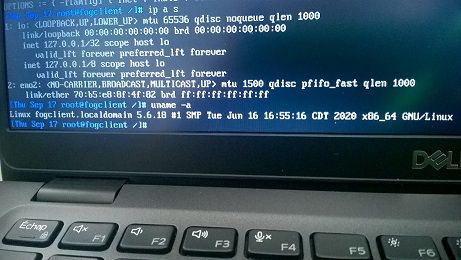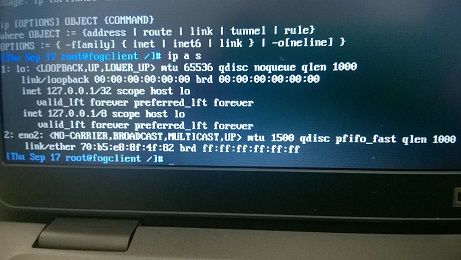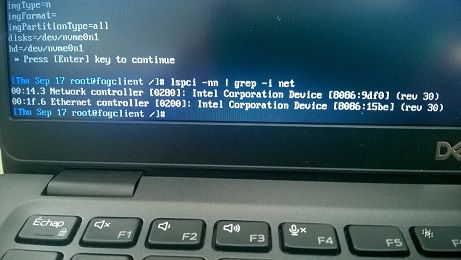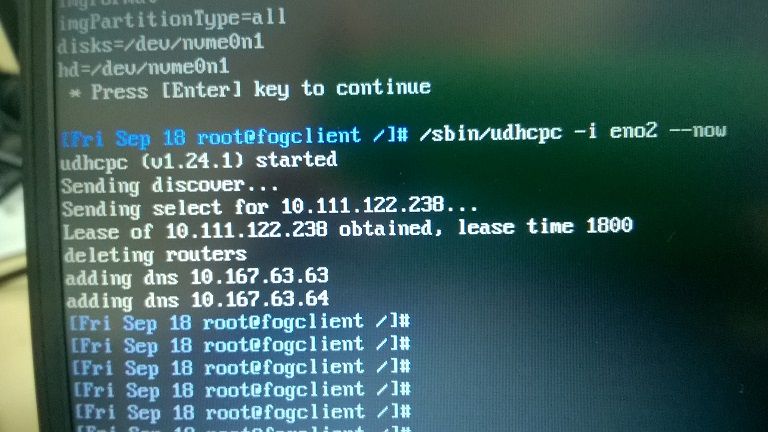Maj bzimage
-
I repeat what Sebastian says “unoffical”, I mean “Kernel.TomElliott.5.6.18.64” . The hardware IDs is PCI\VEN_8086&DEV_15BE&CC_0200 built in. When I pick an option FOS Linux can’t get an adresse IP from DHCP and don’t know if FOS see the network adapter.
-
@jps The network adapter 8086:15BE first appeared in the linux kernel 4.12 and exists in these kernels [ 4.12–4.20, 5.0–5.8 ]. With that said 5.6.18 should have the required driver installed. (it should just work).
To debug this issue schedule another deploy/capture task but before you hit the schedule task button tick the debug checkbox then schedule the task.
PXE boot the 5300 or 5500 computer. After a few screens of text you need to clear with the enter key you will be dropped to a linux command prompt on the target computer. This is the FOS Linux command prompt.
Please post the results of the following commands. (a clear screen shot of the text taken with a mobile phone will work here).
lspci -nn | grep -i netip a suname -aLets start with those. I have another command for you to key in but lets make sure we are getting an output of those first.
-
This post is deleted! -
Here they are :



-
@jps Ok looking at the pictures everything looks good (it should be working), but do see for eno2 there is no carrier (cable not plugged in). I am a little surprised as its named eno2 but if that is what the hardware selected its ok, because its a logical name.
Do we know why its saying the network cable isn’t plugged in? I would think that it had to be if the system pxe booted this far.
If you are still at the fos linux command prompt you can test this command and see what it produces
/sbin/udhcpc -i eno2 --now -
Here it is
I specify I re-run “ip a s” and there is no “no-carrier”
-
@jps Ok this is interesting an also makes me think.
I want you to do this in sequence step by step. If you are still at the command prompt just reboot the target computer the job will still exist in FOG.
- PXE boot the computer in debug mode.
- As soon as you get to the FOS Linux command prompt key in
ip a s. Confirm that you do not have an IP address - Wait ~30 seconds.
- Key in
/sbin/udhcpc -i eno2 --now - Confirm that it detects an IP address.
If the above does work then time resolves the problem. This is usually an indication of spanning tree being used on your building network switch. I want you to check with your network team to ensure on of the fast spanning tree protocols (portfast, RSTP, MSTP, fast-stp, or what ever your switch mfg calls it) is used on the network port where the computer is. Standard spanning tree reacts to slowly because FOS Linux boots in 10 seconds and standard spanning tree doesn’t start forwarding data for 27 seconds. By the time standard spanning tree starts forwarding data FOS Linux has already given up. That is what I think.
-
I could not reiterate the case where I have no ip address. On the other hand at boot (not as a debug task) I have this:

-
This post is deleted! -
@Sebastian-Roth When I reboot the machine to it’s installed OS it runs on gigabit.
-
@jps
command not found…?! Possibly and issue in the scripts?! I will take a look. -
What version of FOG are you running?
I ask because the “Starting eno2 interface” hasn’t been around since 1.3.0 was released.
-
@Tom-Elliott Version: 5929
-
@jps While you can go with just updating kernel and init files with some manual adjustments in the config I am wondering if a proper upgrade to 1.5.9 would be the better choice in your case. We fixed hunderds of bugs since then.
Why so you still use such an old version?